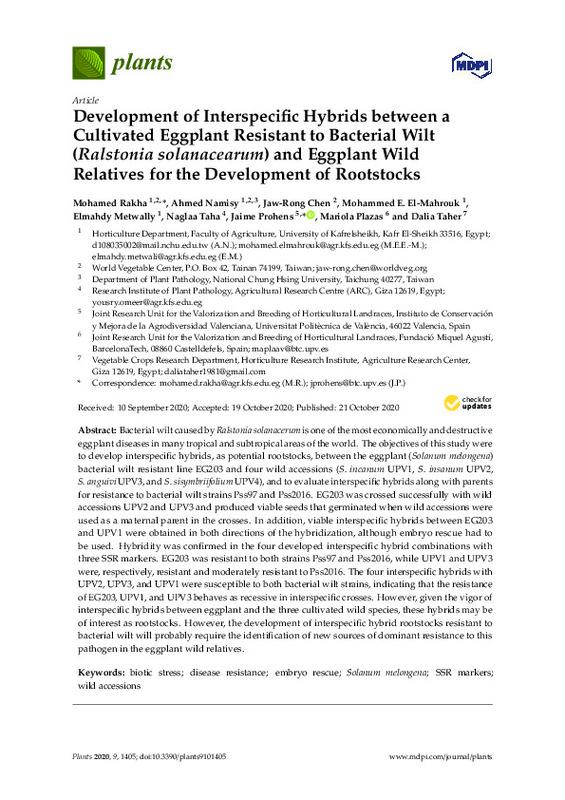JavaScript is disabled for your browser. Some features of this site may not work without it.
Buscar en RiuNet
Listar
Mi cuenta
Estadísticas
Ayuda RiuNet
Admin. UPV
Development of Interspecific Hybrids between a Cultivated Eggplant Resistant to Bacterial Wilt (Ralstonia solanacearum) and Eggplant Wild Relatives for the Development of Rootstocks
Mostrar el registro completo del ítem
Rakha, M.; Namisy, A.; Chen, J.; El-Mahrouk, ME.; Metwally, E.; Taha, N.; Prohens Tomás, J.... (2020). Development of Interspecific Hybrids between a Cultivated Eggplant Resistant to Bacterial Wilt (Ralstonia solanacearum) and Eggplant Wild Relatives for the Development of Rootstocks. Plants. 9(10):1-13. https://doi.org/10.3390/plants9101405
Por favor, use este identificador para citar o enlazar este ítem: http://hdl.handle.net/10251/176291
Ficheros en el ítem
Metadatos del ítem
| Título: | Development of Interspecific Hybrids between a Cultivated Eggplant Resistant to Bacterial Wilt (Ralstonia solanacearum) and Eggplant Wild Relatives for the Development of Rootstocks | |
| Autor: | Rakha, Mohamed Namisy, Ahmed Chen, Jaw-Rong El-Mahrouk, Mohammed E. Metwally, Elmahdy Taha, Naglaa Taher, Dalia | |
| Entidad UPV: |
|
|
| Fecha difusión: |
|
|
| Resumen: |
[EN] Bacterial wilt caused by Ralstonia solanacerum is one of the most economically and destructive eggplant diseases in many tropical and subtropical areas of the world. The objectives of this study were to develop ...[+]
|
|
| Palabras clave: |
|
|
| Derechos de uso: | Reconocimiento (by) | |
| Fuente: |
|
|
| DOI: |
|
|
| Editorial: |
|
|
| Versión del editor: | https://doi.org/10.3390/plants9101405 | |
| Código del Proyecto: |
|
|
| Agradecimientos: |
This research and the APC were funded by Global Crop Diversity Trust [GS20001]. This work was undertaken as part of the initiative "Adapting Agriculture to Climate Change: Collecting, Protecting and Preparing CropWild ...[+]
|
|
| Tipo: |
|









